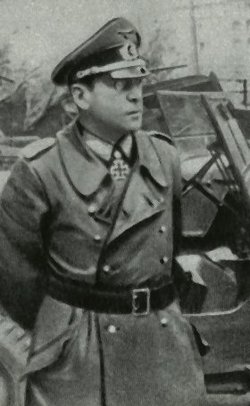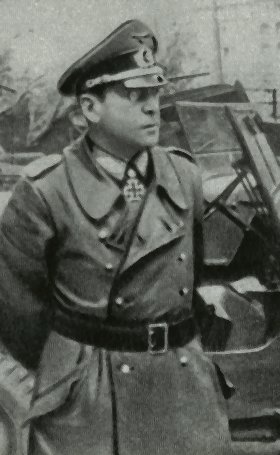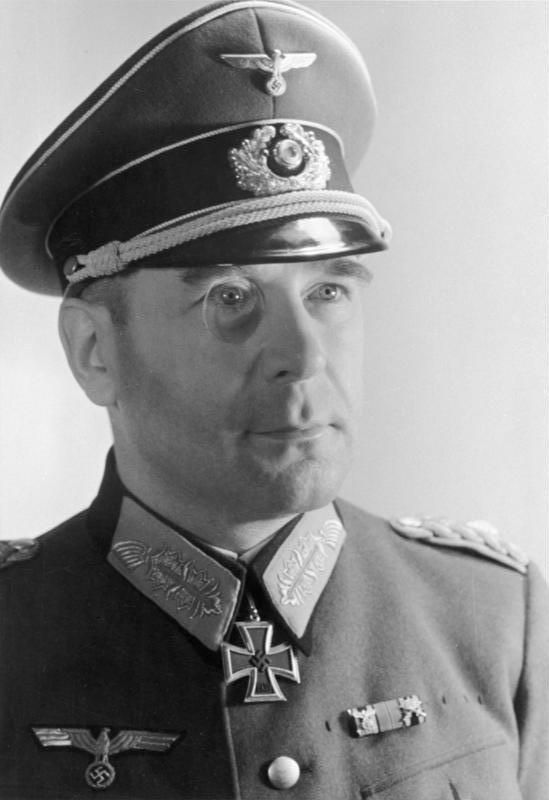Born in Helmstedt, he volunteered for service within the Imperial German Army in 1914, was promoted to lieutenant in 1915, and to first lieutenant in 1925. Krebs was a career officer, and reached the position of Chief of Staff of various army groups until he became a General of Infantry.
As chief of the Army General Staff, Krebs was in the Führerbunker below the Reich Chancellery during the Battle for Berlin.
On April 28, 1945, Krebs made his last telephone call from the Führerbunker. He called General Wilhelm Keitel at the new Supreme Command Headquarters in Fürstenberg. He told Keitel that, if relief did not arrive within 48 hours, all was lost. Keitel promised to exert the utmost pressure on General Walther Wenck who commanded the German 12th Army and General Theodor Busse who commanded the German 9th Army. The 12th Army was attacking towards Berlin from the West and the 9th Army was attacking from the South.
On April 22, Adolf Hitler had ordered both of these armies to link up and come to the relief of Berlin. In addition, forces under General Rudolf Holste were to have attacked towards Berlin from the north.
Later on April 28, when it was discovered that Heinrich Himmler was trying to negotiate a backdoor surrender to the Allies via Count Folke Bernadotte, Krebs became part of a tribunal set up by Hitler to Court Martial associates of Himmler, deemed to be sufficiently close to have known of his intentions, who could be rounded up in Berlin. One person to face this tribunal was Hermann Fegelein, Himmler's adjutant, and Eva Braun's brother in law. SS General Wilhelm Mohnke presided over the tribunal which, in addition to Krebs and Mohnke, included Generals Johann Rattenhuber and Wilhelm Burgdorf.
On April 29, Krebs, Burgdorf, Joseph Goebbels, and Martin Bormann witnessed and signed the last will and testament of Adolf Hitler. Hitler dictated the document to his personal private secretary, Traudl Junge. Bormann was head of the Party Chancellery and private secretary to Hitler.
Late in the evening of April 29, Krebs contacted General Alfred Jodl by radio and made the following demands: "Request immediate report. Firstly, of the whereabouts of Wenck's spearheads. Secondly, of time intended to attack. Thirdly, of the location of the 9th Army. Fourthly, of the precise place in which the 9th Army will break through. Fifthly, of the whereabouts of General Holste's spearhead."
In the early morning of April 30, Jodl replied to Krebs: "Firstly, Wenck's spearhead bogged down south of Schwielow Lake. Secondly, 12th Army therefore unable to continue attack on Berlin. Thirdly, bulk of 9th Army surrounded. Fourthly, Holste's corps on the defensive."
Late on April 30, the Soviet forces continued to fight their way into the center of Berlin. Hitler then committed suicide. In accordance with Hitler's Last Will and Testament, Joseph Goebbels, the Minister for Public Enlightenment and Propaganda, became the new Head of Government and Chancellor of Germany.
On May 1, within hours of Hitler's suicide on April 30, Chancellor of Germany, Joseph Goebbels sent Krebs and Colonel Theodor von Dufving, under a White Flag, to deliver a letter he had written to General Vasily Chuikov. Dufving was Weidling's Chief of Staff. The letter contained surrender terms acceptable to Goebbels. Chuikov, as Commander of the Soviet 8th Guards Army, commanded the Soviet Forces in central Berlin. Krebs arrived shortly before 4 am., and took Chuikov by surprise. Krebs, a Russian speaker, informed Chuikov that Hitler and Eva Braun, his wife, had killed themselves in the Führerbunker. Chuikov, who was not aware that there was a bunker under the Reich Chancellery or that Hitler was married, calmly said that he already knew all of this. Chuikov was not, however, prepared to accept the terms in Goebbels's letter or to negotiate with Krebs. The Soviets were unwilling to accept anything other than unconditional surrender. Krebs was not authorized by Goebbels to agree to an unconditional surrender. The meeting ended with no agreement. According to Traudl Junge, Krebs returned to the bunker looking "worn out, exhausted". Krebs's surrender of Berlin was thus impeded as long as Goebbels was alive.
At around 8 pm., on the evening of May 1, Goebbels removed this impediment. Shortly after murdering their own children, Goebbels and his wife went up to the garden of the Chancellery. Here, Joseph and Magda Goebbels committed suicide after arranging to have their bodies burned by Goebbels's Adjutant, Günther Schwägermann. But, even after the death of Goebbels, Krebs was in a state of extreme despair. He was now suicidal himself. The responsibility for surrendering the city fell to General of the Artillery Helmuth Weidling, the Commander of the Berlin Defense Area.
As the Soviets advanced on the Führerbunker, Krebs was last seen by others, including Junge, in the bunker when they themselves left to attempt to escape. Junge relates how she approached Krebs to say goodbye and how he straightened up and smoothed his uniform before greeting her for the last time. Krebs and at least two other senior officers, including General Wilhelm Burgdorf, stayed behind with the stated intention of committing suicide. The bodies of Krebs and Burgdorf were found when Soviet personnel entered the bunker.
Born in Helmstedt, he volunteered for service within the Imperial German Army in 1914, was promoted to lieutenant in 1915, and to first lieutenant in 1925. Krebs was a career officer, and reached the position of Chief of Staff of various army groups until he became a General of Infantry.
As chief of the Army General Staff, Krebs was in the Führerbunker below the Reich Chancellery during the Battle for Berlin.
On April 28, 1945, Krebs made his last telephone call from the Führerbunker. He called General Wilhelm Keitel at the new Supreme Command Headquarters in Fürstenberg. He told Keitel that, if relief did not arrive within 48 hours, all was lost. Keitel promised to exert the utmost pressure on General Walther Wenck who commanded the German 12th Army and General Theodor Busse who commanded the German 9th Army. The 12th Army was attacking towards Berlin from the West and the 9th Army was attacking from the South.
On April 22, Adolf Hitler had ordered both of these armies to link up and come to the relief of Berlin. In addition, forces under General Rudolf Holste were to have attacked towards Berlin from the north.
Later on April 28, when it was discovered that Heinrich Himmler was trying to negotiate a backdoor surrender to the Allies via Count Folke Bernadotte, Krebs became part of a tribunal set up by Hitler to Court Martial associates of Himmler, deemed to be sufficiently close to have known of his intentions, who could be rounded up in Berlin. One person to face this tribunal was Hermann Fegelein, Himmler's adjutant, and Eva Braun's brother in law. SS General Wilhelm Mohnke presided over the tribunal which, in addition to Krebs and Mohnke, included Generals Johann Rattenhuber and Wilhelm Burgdorf.
On April 29, Krebs, Burgdorf, Joseph Goebbels, and Martin Bormann witnessed and signed the last will and testament of Adolf Hitler. Hitler dictated the document to his personal private secretary, Traudl Junge. Bormann was head of the Party Chancellery and private secretary to Hitler.
Late in the evening of April 29, Krebs contacted General Alfred Jodl by radio and made the following demands: "Request immediate report. Firstly, of the whereabouts of Wenck's spearheads. Secondly, of time intended to attack. Thirdly, of the location of the 9th Army. Fourthly, of the precise place in which the 9th Army will break through. Fifthly, of the whereabouts of General Holste's spearhead."
In the early morning of April 30, Jodl replied to Krebs: "Firstly, Wenck's spearhead bogged down south of Schwielow Lake. Secondly, 12th Army therefore unable to continue attack on Berlin. Thirdly, bulk of 9th Army surrounded. Fourthly, Holste's corps on the defensive."
Late on April 30, the Soviet forces continued to fight their way into the center of Berlin. Hitler then committed suicide. In accordance with Hitler's Last Will and Testament, Joseph Goebbels, the Minister for Public Enlightenment and Propaganda, became the new Head of Government and Chancellor of Germany.
On May 1, within hours of Hitler's suicide on April 30, Chancellor of Germany, Joseph Goebbels sent Krebs and Colonel Theodor von Dufving, under a White Flag, to deliver a letter he had written to General Vasily Chuikov. Dufving was Weidling's Chief of Staff. The letter contained surrender terms acceptable to Goebbels. Chuikov, as Commander of the Soviet 8th Guards Army, commanded the Soviet Forces in central Berlin. Krebs arrived shortly before 4 am., and took Chuikov by surprise. Krebs, a Russian speaker, informed Chuikov that Hitler and Eva Braun, his wife, had killed themselves in the Führerbunker. Chuikov, who was not aware that there was a bunker under the Reich Chancellery or that Hitler was married, calmly said that he already knew all of this. Chuikov was not, however, prepared to accept the terms in Goebbels's letter or to negotiate with Krebs. The Soviets were unwilling to accept anything other than unconditional surrender. Krebs was not authorized by Goebbels to agree to an unconditional surrender. The meeting ended with no agreement. According to Traudl Junge, Krebs returned to the bunker looking "worn out, exhausted". Krebs's surrender of Berlin was thus impeded as long as Goebbels was alive.
At around 8 pm., on the evening of May 1, Goebbels removed this impediment. Shortly after murdering their own children, Goebbels and his wife went up to the garden of the Chancellery. Here, Joseph and Magda Goebbels committed suicide after arranging to have their bodies burned by Goebbels's Adjutant, Günther Schwägermann. But, even after the death of Goebbels, Krebs was in a state of extreme despair. He was now suicidal himself. The responsibility for surrendering the city fell to General of the Artillery Helmuth Weidling, the Commander of the Berlin Defense Area.
As the Soviets advanced on the Führerbunker, Krebs was last seen by others, including Junge, in the bunker when they themselves left to attempt to escape. Junge relates how she approached Krebs to say goodbye and how he straightened up and smoothed his uniform before greeting her for the last time. Krebs and at least two other senior officers, including General Wilhelm Burgdorf, stayed behind with the stated intention of committing suicide. The bodies of Krebs and Burgdorf were found when Soviet personnel entered the bunker.
Sponsored by Ancestry
Advertisement
Records on Ancestry
Advertisement




